About David Talent Jewell (founder of the town of Jewell Junction) and his family
About David Talent Jewell (founder of the town of Jewell Junction) and his family
The War of 1812 helped to make Jewell Junction possible. An Act of Congress approved March 3, 1855, entitled "An Act in Addition to Certain Acts Granting Bounty Land to Certain Officers and Soldiers who have been engaged in Military Service of the United States". This was to encourage settlers to come settle west of the Mississippi River. In pursuance of that act, a warrant of 160 acres in favor of William Winslow, a physician in Captain Sprague Company of Maine Militia, War of 1812 was recorded in the General Land Office. The grant was presented to William Winslow in 1855, signed by President Pierce. William sold the grant to Cornelius Haden in 1856. Haden could possible have paid less that $1 per acre. Mr. Haden kept the land for several years. Whether he purchased the land from Winslow in the state of Maine or Wisconsin is unknown; however, the land transaction is recorded in the Fort Dodge land office and not on record in Webster City. He may have purchased the land sight unseen as this was frequently done at that time.
There were settlers along the Skunk River in 1855, and along the Boone River in the 1840s. Between the two rivers where was just prairie and timber. Cornelius Haden lived in Wisconsin. It is possible that he knew the Jewell family and sold the land to David Talent Jewell, who brought his family to this area in 1877. By that time, section lines and roads were laid out. Lakins Grove was the nearest post office. There was a school house there in Lakins Grove, located along the river one mile east of what is now Jewell. The Jewell family attended this school.
A narrow gauge railroad had been built north from Ames, and it stopped near the corner of the four townships (Ellsworth, Scott, Lyon, and Lincoln) where the railroad crossed the Skunk River and the town of Callanan was started and quickly grew.
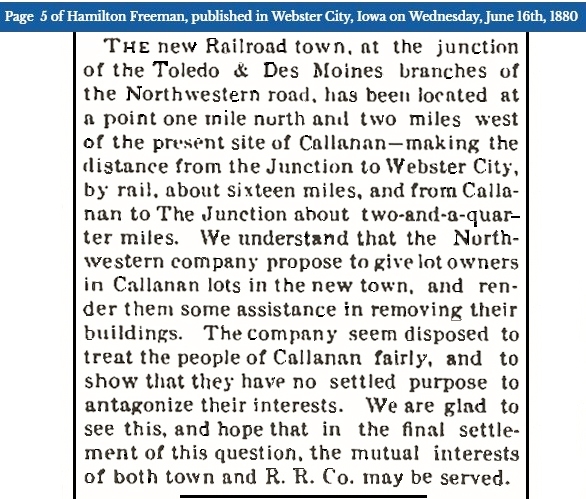
When the Toledo and Northwestern, which was standard gauge or wide gauge track, came west from Tama City, and the narrow gauge company went bankrupt, the Toledo and Northwestern bought it out. They rebuilt the railroad west from the Skunk River and both roads by-passed Callanan, so as a town, Callanan was doomed. It was evident that there would be a crossing of the railroad tracks, which would call for a town, so David T. Jewell made an agreement with the Toledo Northwestern Railroad Company. A copy of that signed agreement and the text follows:
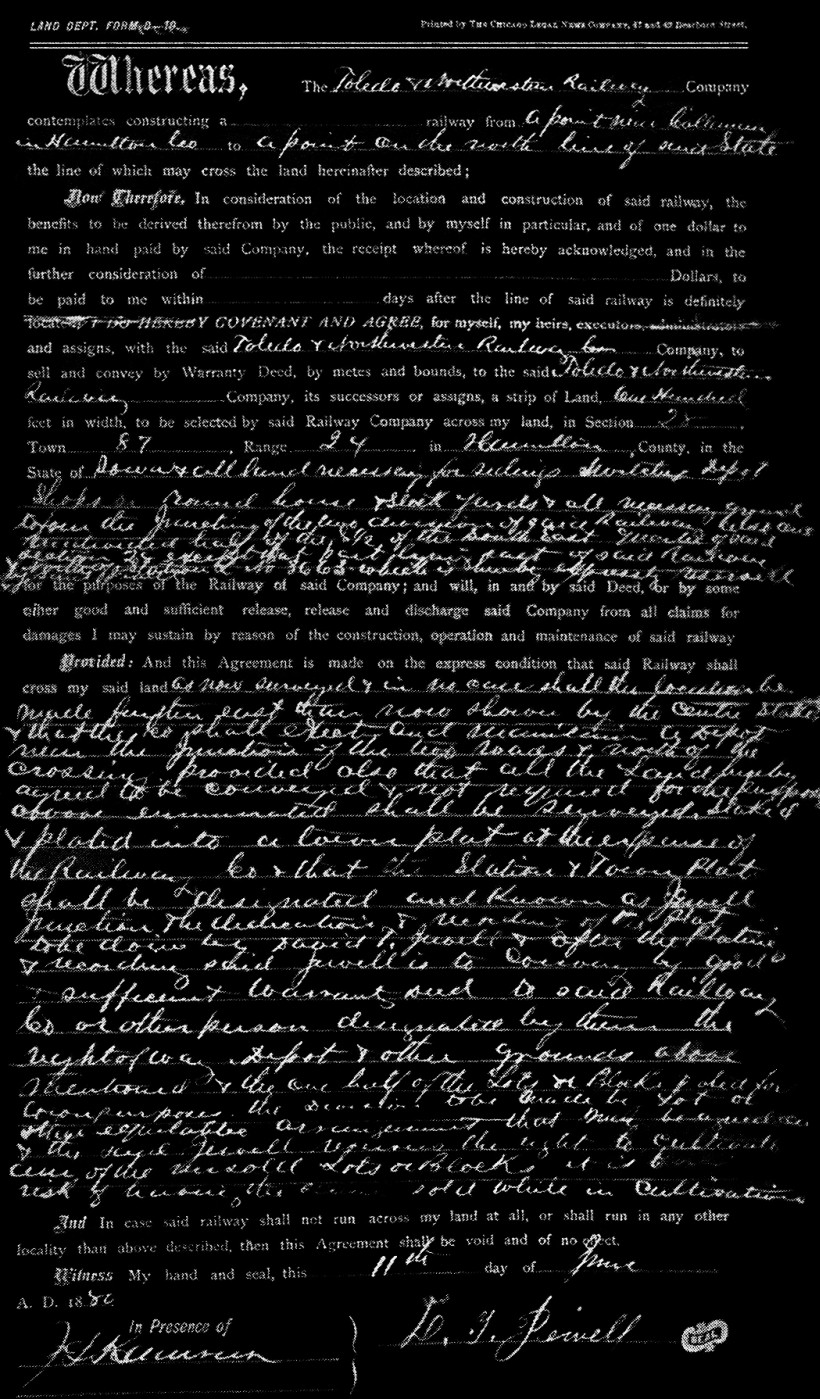 |
|
LAND DEPT. FORM D-19 Printed by the Chicago Legal News Co. 47 and 49 Dearborn Street Whereas, The Toledo and Northwestern Railway Company contemplated constructing a railway from a point near Callanan in Hamilton County to a point on the north line of said State, the line of which may cross the land hereinafter described: Now Therefore, in consideration of the location and construction of said railway, the benefits to be derived therefrom by the public, and by myself in particular, and of one dollar to me in hand paid by said Company, the receipt whereof is hereby acknowledged, and in the further consideration of Dollars, to be paid to me within days after the line of said railway is definitely located I DO HEREBY COVENANT AND AGREE, for myself, my heirs, executors, administrators and assigns, with the said Toledo and Northwestern Railway Company, to sell and convey by Warranty Deed, by metes and bounds, the said Toledo and Northwestern Railway Company, it seccessors or assigns, a strip of land One Hundred feet in width, to be selected by said Railway Company across my land, in Section 28, Town 87, Range 24, in Hamilton County, in the State of Iowa and all land necessary for sidings, switches, depot, shops or round house and stock yards and all necessary ground to form the Junction of the two divisions of said Railway, also one undivided half of the S1/2 of the South East quarter of said section 28 except that part lying east of said Railway and North of the Station No. 366 and which is hereby expressly reserved by said Jewell, for the purposes of the Railway of said Company; and will, in and by said Deed, or by some other good and sufficient release, release and discharge said Company from all claims for damages I may sustain by reason of the construction, operation and maintenance of said railway. Provided: And this Agreement is made on the express condition that said Railway shall cross my said land as now surveyed and in no case shall the location be made further east than now shown by the center stake and that the Company shall erect and maintain a depot near the Junction of the two roads and north of the crossing provided also that all the land hereby agreed to be conveyed and not required for the purpose above enumerated shall be surveyed, staked and platted into a town plat at the expense of the Railway Co. and that the station and town plat shall be designated and known as Jewell Junction. The dedication and recording of the plat to be done by said David T. Jewell and after the platting and recording, said Jewell is to convey by good and sufficient warranty deed to said Railway Co. or other person designated by them, the right of way, depot and other grounds above mentioned and the one half of the Lots or blocks platted for town purposes. The division to be made by lot or other equitable assignment that such be agreed on and the said Jewell reserved the right to cultivate any of the unsold lots or blocks, at his own risk of having same sold while in cultivation. And in case said railway shall not run across my land at all, or shall run in any other locality than above described, then this Agreement shall be void and of no effect. Witness My hand and seal, this 11th day of June A. D. 1880. signed by D. T. Jewell
|
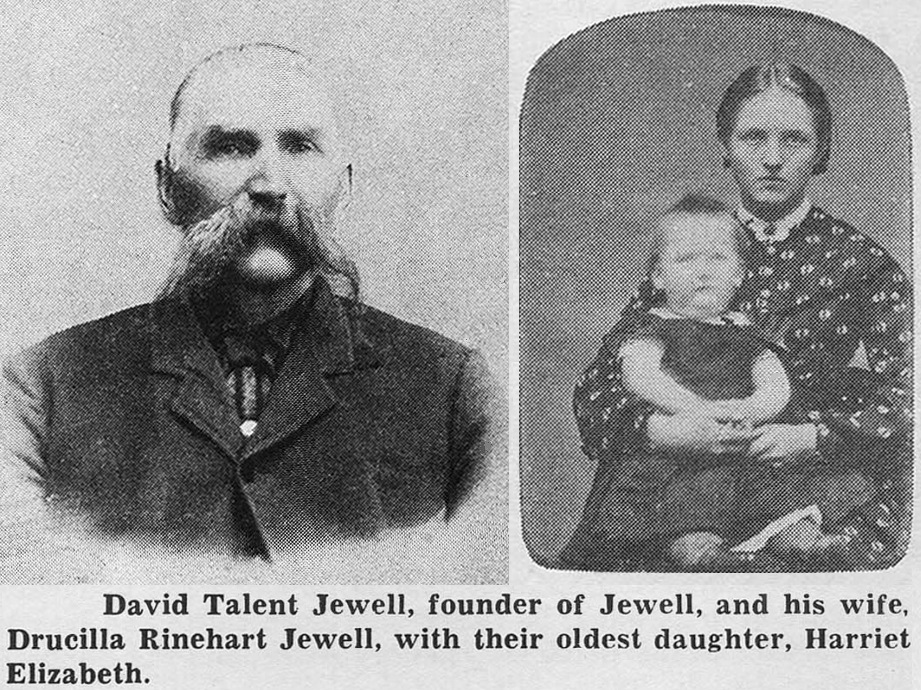
Joseph Jewell, father of David Talent Jewell, lived in Edinburgh, New York and then moved with his family to Hortensville, Wisconsin where David T. Jewell was born in 1835. Twenty five years later on November 8, 1860, David Jewell married Drucilla Rinehart (born October 29, 1843) in Neenah, Wisconsin. To this union, nine children were born. Two Jewell children died in infancy; Lydia was born in 1864 and died 42 days later; Emma was born in 1871 and died in September of 1872.
Members of the David and Drucilla Jewell family born in Wisconsin:David and his oldest son, Chester, came to Iowa in the mid to late 1870s, and decided the family should settle on the land in Hamilton County, Iowa which he had purchased from Cornelius Haden when they were living in Wisconsin. David and Chester worked to build a home, but because there were no established towns nearby, they hauled all of the building materials in a wagon from Webster City.Harriet (Hattie) Elizabeth Jewell, born January 20, 1862 in Hortonville, Wisconsin, lived in Appleton and Stevens Point, Wisconsin before moving to Iowa with her parents in 1876. Hattie married George Claflin on November 25, 1879, and the two had a daughter, Ethel and a foster daughter, Irene Reinhardt. After living in Jewell for several years, they moved to Minnesota in a covered wagon. In 1899, Hattie and George moved back to Iowa to live on a farm east of Jewell where she lived for the next 56 years. They were members of the Methodist Church. Hattie died at age 96 on October 29, 1958, and was buried in Jewell's Evergreen Cemetery. Her husband George had died December 19, 1918.
Chester Carlos Jewell born January 5, 1866, in Stevens Point, Wisconsin. Chester married Abigail Ann Clair August 7, 1890, and the two raised children Bessie Madline (who died at age 5) and Earl Chester. After living for years in Jewell, Iowa, Chester and his family moved to Spooner, Wisconsin in 1909 where he died March 24, 1917;
Ida Estella Jewell was born in 1869. She married Jack Jewell. They moved to Shell Lake, Wisconsin; Of the Jewell family, only Ida was still living in 1968.
Jennie Arilla Jewell, born in 1874, married Alva Headley June 26, 1901, and they had two children, Harold and Hazel who married Mr. Maurice Eddy. Jennie and Alva Headley lived in Jewell, Kamrar, Bringham Lake, Minnesota, and later moved to Aurelia, Iowa. Jennie passed away at age 90 on October 16, 1964.
David Jewell's daugher Hattie later told the story this way: "My father, David T. Jewell, and my oldest brother, Chester, came from Appleton, Wisconsin in the spring of 1877, and built a home. They hauled all of the building materials from Webster City in a wagon. My mother and the rest of us came in June as soon as my father got the house so we could live in it. He met us at Webster City with a wagon and old farm team. None of us had ever seen any prairie before in our lives. Father bought a cook stove, plow and some groceries and loaded them, with us and our trunks into the wagon. There was only one seat in the wagon. There were no roads between Webster City and our new home. You just drove down anywhere over the prairie on the high land between the sloughs. We forded the old outlet to old Mud Lake, which in those days was a nice lake. The water was so high it came in the wagon box and we had to climb on the cook stove and boxes to keep dry.
When we reached the house late in the afternoon, we were glad to find one of the neighbors had sent us a loaf of bread, some green vegetables and a half pail of wild strawberries. We ate our first meal on my father's tool chest and filled some ticks with hay and made beds on the floor for the night. There were no doors hung and we stood them up and propped them up with two by fours to keep out the mosquitos and snakes. There were a great many snakes; we always took a stick along to kill the snakes when we went to the spring on the bank of the outlet where we got all the water for the house. We also took a stick to kill snakes whenever we went to the garden which we made where the elevator now stands.
My father paid $20.00 for our first cow. Butter was 9 cents and we paid our first hired man $16 a month. In the fall there was always the danger of prairie fires. Everyone had to have breaking around their buildings and fields. One night we were awakened by the glow in the sky and had to all get up and fight fire. My father had to hitch up a team and plow while the rest of us made back fires and switched them out with old sacks. But we never had any loss by prairie fires.
The outlet was full of fish and we always had all we wanted. When the water was low we used to scoop them out with a pitch fork on the riffles, mosly sunfish, suckers and bullheads. The wolves used to howl around nights. When we would butcher, they would gather around the buildings and howl. When it was dark enough we could see their eyes shining when we looked out of the windows. Wild ducks were plentyful the summer through as they nested in the sloughs and ponds. We could go to the outlet and shoot ducks any time we wanted them. The grass around the sloughs was full of wild strawberries as big as your thumb.
There were large herds of cattle herded all around us. About 800 head were driven at night to the hill west of town where Mrs. Westre now lives. It was surrounded with water except a narrow strip to the north. Some herders had shantys there on "Herders' Knoll", as it was called. Our nearest neighbors lived on the corner a mile north of Jewell. George Klatzbah and his brother Conrad lived east of them on the old Voss farm. Justin Smith lived where Cecil Anderson now (1931) lives. That was all the neighbors we had except the W. Blank family, about 2 and one half miles northwest. You could see a team or anyone coming miles away.
We got our mail at the post office at Lakin's Grove, which was in Swen Johnson's store. Peter Ryberg had a blacksmith shop there also. The next year after we came, by brother Chester went to Lakin's Grove one day on foot and bare footed, as it was in May. A big snow storm came up and one of the neighbors loaned him some long home-knitted woolen socks and a horse to come home.
The children went to school in the old school house on the corner a mile east of Jewell. W. Anderson was their teacher. The school children's dinner in those days was usually "Johnny cake" and milk in a pail and they carried the spoon in their pocket. Flour was hard to get. We hauled our wheat to Bones Mill on the Boone River to get it ground. We also bought our coal from the mines on the Boone River.
When the railroad came through, we boarded about 20 men and roomed all of them but 6. We only had 6 rooms in our house. One bunch of graders on the west track boarded in a cook car, and one day their car failed to come with their bread from Des Moines. Their cook came to our house to see if we could help them out. But as we were baking twice a day to feed our own men, all we could do was help them make biscuit. He brought up a sack of flour and a pan of lard and I made it all up into biscuit. They baked them at their car.
When the town was laid out west of the elevator, the first school was held in a little building on the south side of the street. The teacher was a man named L. L. Sage. His family lived in the second story. The first church was held in Warburton Bros. Hardware store, but later in Robert H. Rodearmel's drug store, as it was larger. The minister drove from Williams in a buggy. His name was Van Eammons. He was a Presbyterian. He came down Saturday afternoons and stayed with my folks over night."
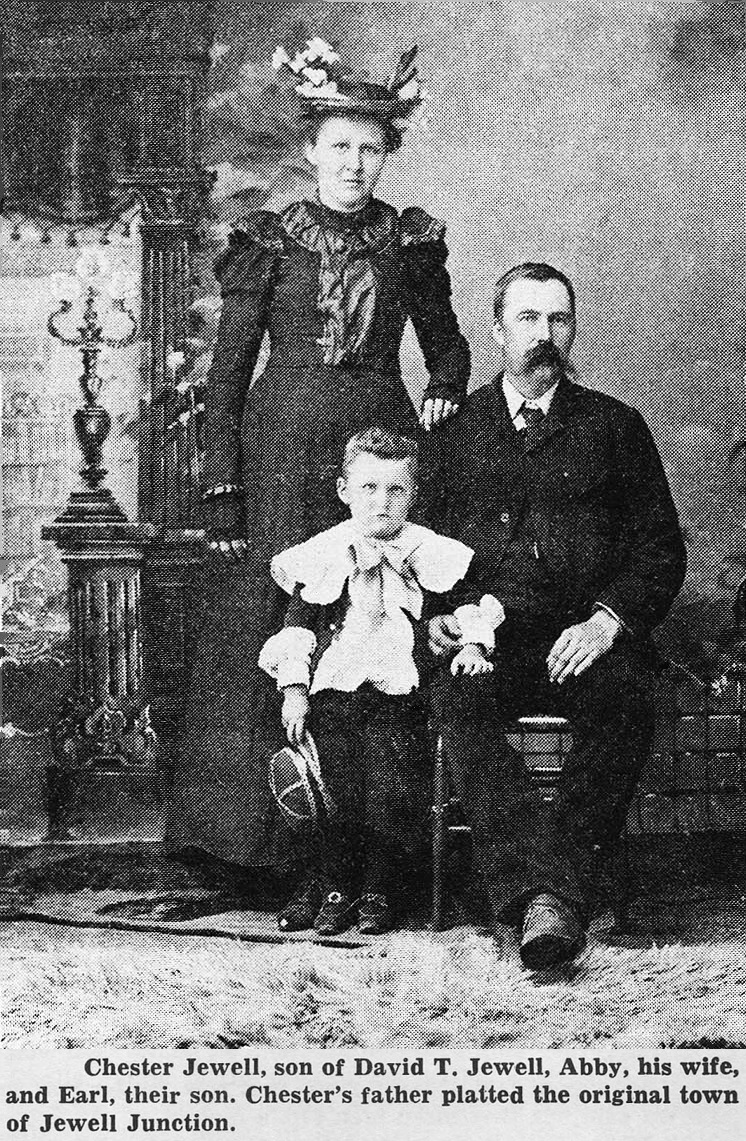
Members of the David and Drucilla Jewell family born in Hamilton County.
John Wilburn Jewell born April 2, 1878, married Nettie Pinckney and they lived on a farm between the communities of Jewell and Ellsworth before selling the farm in 1914 when they moved into the town of Jewell. John and Nettie had no children.
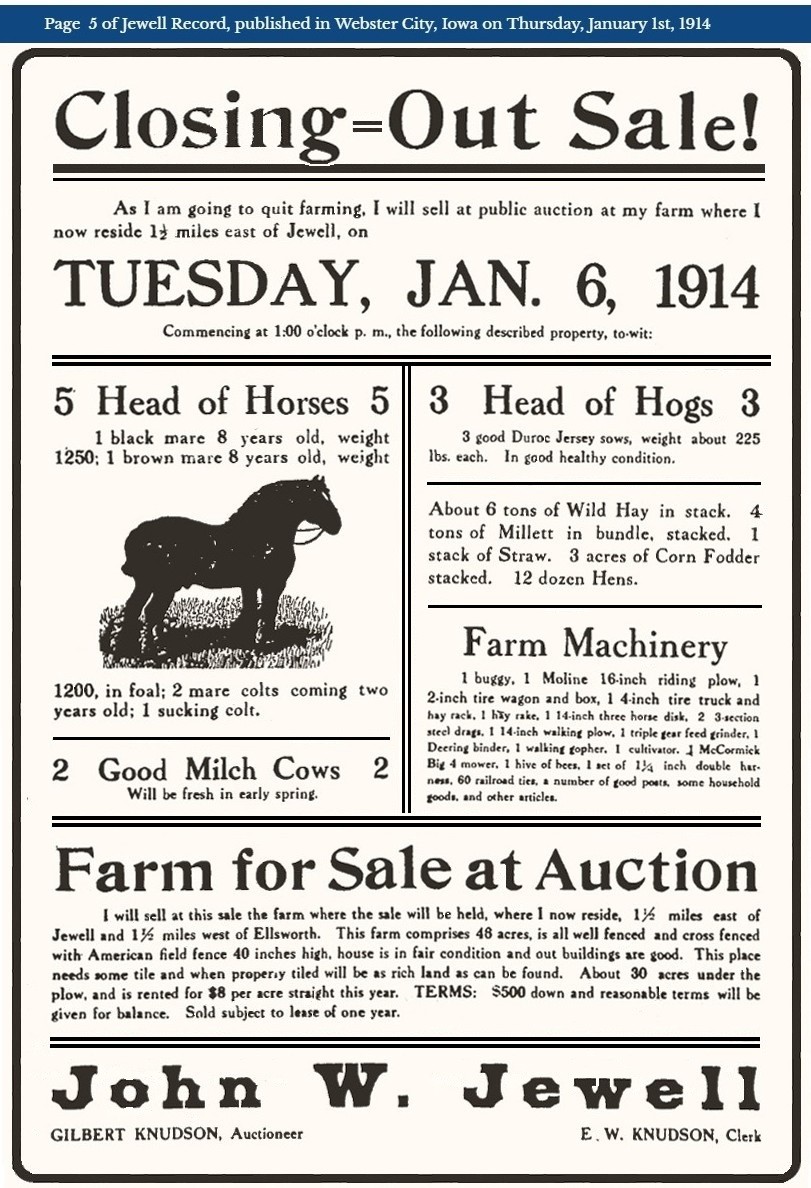
John W. Jewell died September 6, 1939.
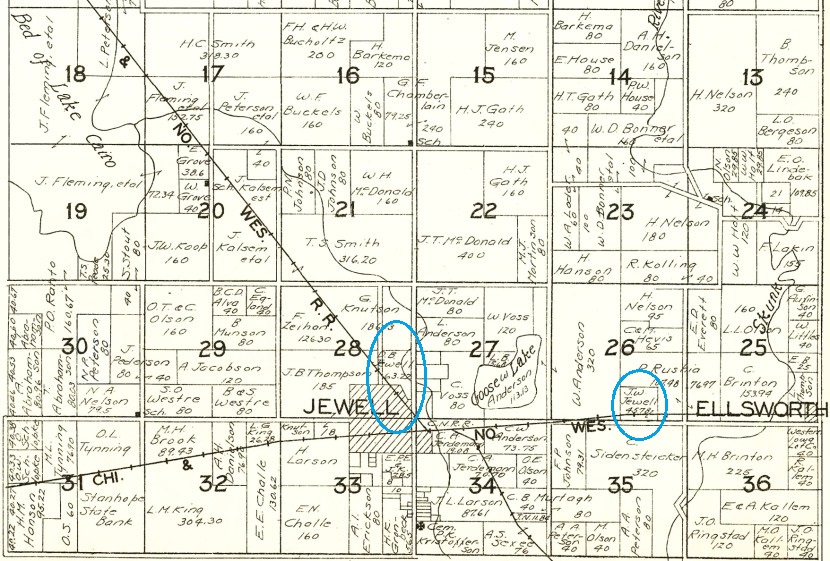
(Click to enlarge this 1930 Plat Map showing a portion of Lyon Township.)
Lula Belle Jewell, born December
2, 1881, graduated from Jewell High School in 1898 and married Elbert M.
Cunard.
The two lived in Webster City,
Kamrar, Irvington, Iowa, and Thermopolis (Wyoming).
They had no children, and Lula
died May 23, 1964 in Thermopolis, Wyoming.
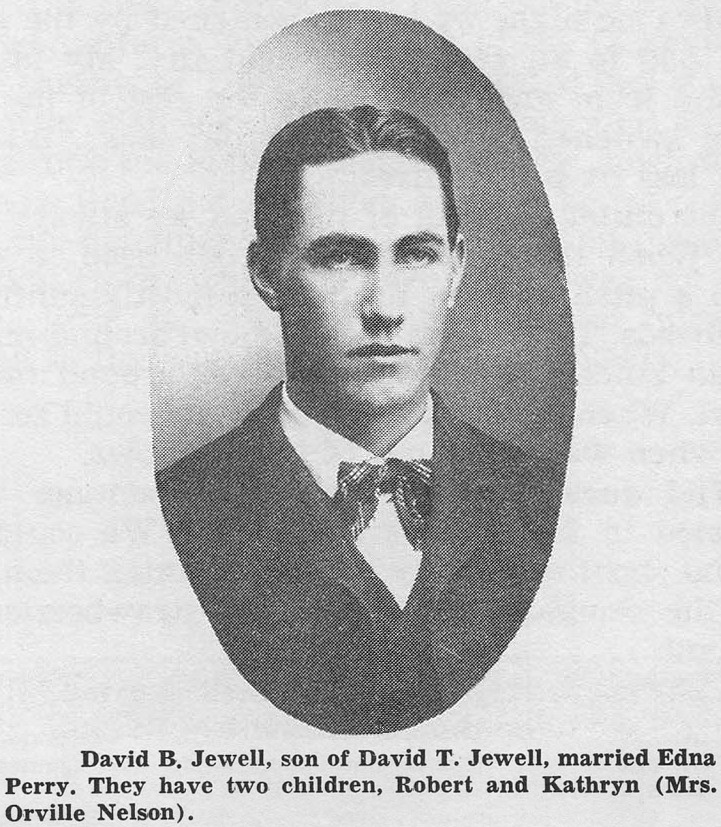
David Bertice Jewell was born
December 6, 1883. He married Edna Perry on February 10, 1908, and
their children were
sons; 1. Robert, who married
Vera Irene Ahrens (obituary)
on October 1, 1931.
Robert and Vera raised two children,
Elaine and Robert.
Elaine married Hank Brandeland
and the two raised children Paul and Julie.
Robert married Sharon and the
couple raised children James and Doreen;
2. Frank Perry Jewell (died at age 20 months in 1911) on May 23, 1910;
and 3. daughter Kathryn, who married Orville Nelson.
David Bertrice Jewell died in 1959.
David Talent Jewell died November 12, 1897 at the age of 75.
On April 16, 1903, David's wife Drucilla remarried, with John Loder being her new partner.
Drucilla died at her home in Jewell on May 16, 1911.
Of the Jewell family, only Ida was still living in 1968.
 |
 |